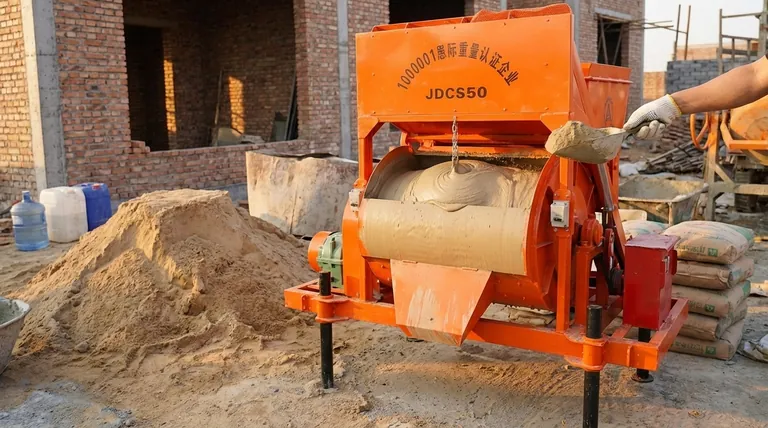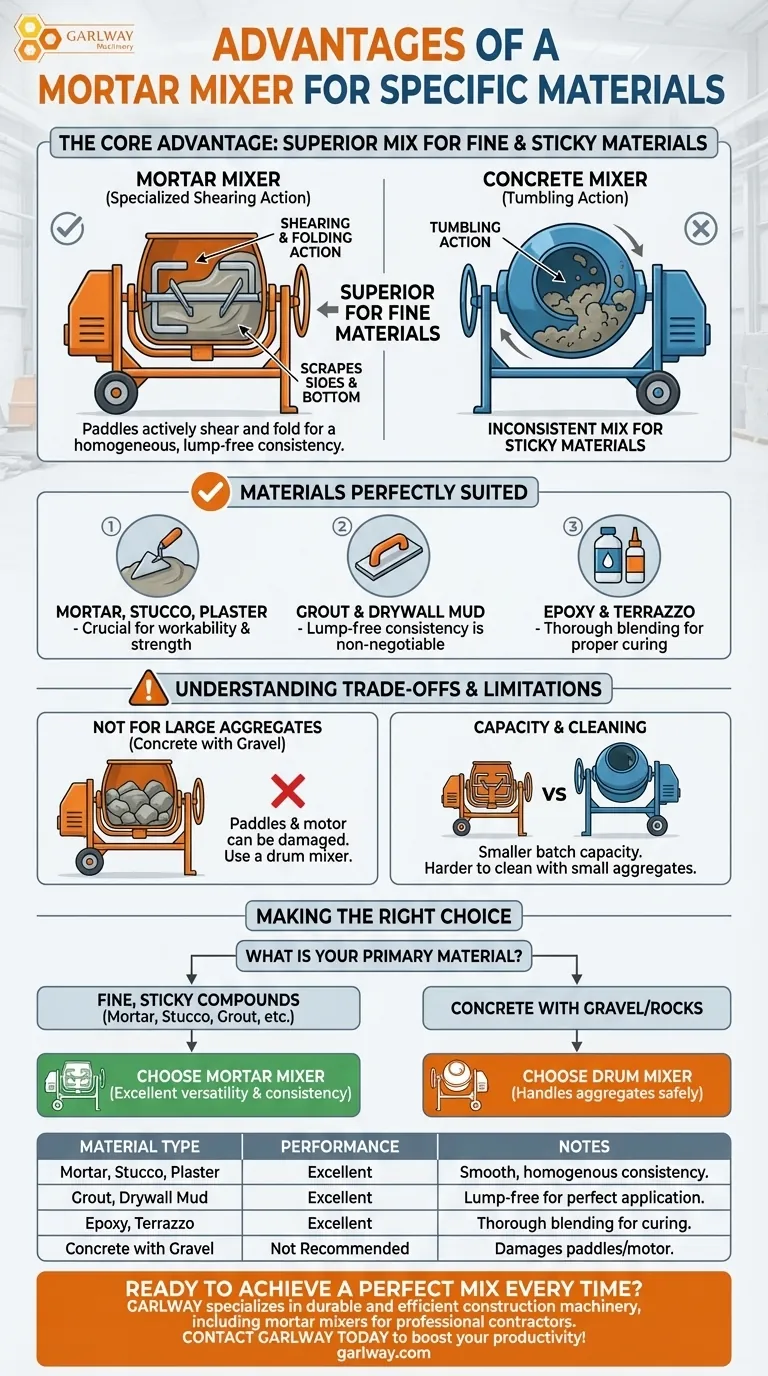The primary advantage of a mortar mixer is its ability to produce a superior, more consistent mix for fine and sticky materials like mortar, stucco, and plaster. Its internal paddle design is engineered specifically for the shearing action these materials require, which a standard tumbling concrete mixer cannot effectively provide.
A mortar mixer isn't just a different type of mixer; it's a specialized tool. Its advantage comes from its design—rotating paddles inside a stationary drum—which actively folds and shears material, guaranteeing the smooth, homogenous consistency essential for high-quality mortar and stucco work.

The Core Design Advantage: Paddles vs. Tumbling
The key to the mortar mixer's effectiveness lies in its fundamental mechanics, which are distinctly different from a typical concrete mixer.
How a Mortar Mixer Works
A mortar mixer features a stationary drum or tank. Inside, a set of horizontal paddles rotates, continuously scraping the sides and bottom of the drum.
The operator adds materials from the top, and the rotating paddles fold the compound, ensuring every particle is uniformly mixed with water. The final product is then discharged from a central hole at the bottom.
Why This Excels with Fine Materials
This design is ideal for thicker, stickier materials. The scraping and shearing action of the paddles is critical for breaking up clumps and ensuring a perfectly smooth, workable consistency.
A standard concrete mixer, which simply tumbles material, often fails to properly mix sticky compounds, leaving dry pockets or an inconsistent texture.
Materials Perfectly Suited for a Mortar Mixer
The specific design of a mortar mixer makes it the superior choice for a range of materials beyond just standard mortar.
Mortar, Stucco, and Plaster
These are the primary applications. The mixer's ability to create a homogenous blend is crucial for the workability, adhesion, and final strength of these materials.
Grout and Drywall Mud
For both tile grout and drywall mud, a lump-free consistency is non-negotiable. A mortar mixer guarantees this smooth texture, which is difficult to achieve by hand or with other mixers.
Specialized Compounds
The mixer's versatility extends to other professional materials like epoxy, terrazzo, and even some paints, where thorough blending of components is essential for the product to cure and perform correctly.
Understanding the Trade-offs and Limitations
While highly effective for its intended purpose, a mortar mixer is not a universal solution. Understanding its limitations is key to preventing damage and achieving good results.
The Challenge with Large Aggregates
Mortar mixers are not designed for concrete that contains gravel or large rocks. The paddles are not built to tumble heavy aggregates and can be damaged.
Attempting to mix large rocks can put extreme strain on the motor and potentially break critical components like the pinion gears.
The Cleaning Consideration
While a mortar mixer can sometimes be adjusted to handle very small aggregates like pea gravel, it makes the machine significantly more difficult to clean thoroughly.
Capacity Differences
Mortar mixers are specialized tools and typically have a smaller batch capacity compared to the larger, drum-style mixers designed for high-volume concrete production.
Making the Right Choice for Your Material
Selecting the correct mixer is a matter of matching the tool to the physical properties of your material.
- If your primary focus is mortar, stucco, or plaster: A mortar mixer is the definitive choice for achieving the consistent, high-quality mix required for professional results.
- If your primary focus is concrete with gravel: You must use a traditional rotating drum concrete mixer to handle the aggregates safely and effectively.
- If your primary focus is a variety of fine, sticky compounds: A mortar mixer offers excellent versatility for materials like grout, drywall mud, and epoxy.
Choosing the right mixer for your material ensures not only the quality of your work but also the longevity of your equipment.
Summary Table:
| Material Type | Mortar Mixer Performance | Notes |
|---|---|---|
| Mortar, Stucco, Plaster | Excellent | Achieves a smooth, homogenous consistency essential for quality work. |
| Grout, Drywall Mud | Excellent | Guarantees a lump-free mix for perfect application. |
| Epoxy, Terrazzo | Excellent | Thoroughly blends components for proper curing. |
| Concrete with Gravel | Not Recommended | Can damage the paddles and motor. Use a drum mixer instead. |
Ready to achieve a perfect mix every time?
GARLWAY specializes in durable and efficient construction machinery, including mortar mixers designed for the demanding needs of professional contractors and construction companies. Our mixers deliver the consistent, high-quality results your projects require.
Contact GARLWAY today to find the right mortar mixer for your specific materials and boost your productivity!
Visual Guide

Related Products
- JDC350 Small Cement Concrete Mortar Mixer
- Auto Concrete Cement Mixer Machine New
- Commercial Construction Mixer Machine for Soil Cement Mixing Concrete
- Construction Products Concrete Plant Machine Mixing Concrete Mixer
- Portable Electric Concrete Mixer Machine for Cement Mixing
People Also Ask
- Why is drum capacity important in a mortar mixer? Optimize Your Jobsite Efficiency
- What makes the design of self-loading concrete mixers durable? Built for Rugged Sites & Long-Term Value
- What are the key factors in selecting a mixer for a flat mouth mixer truck? Ensure Quality & Efficiency
- What safety features make self-loading mobile concrete mixers advantageous? Enhance On-Site Safety and Efficiency
- What steps are involved in loading a self-loading concrete mixer? A Guide to Efficient, High-Quality Mixing
- What factors should be considered when choosing a mixing method? A Guide to Maximizing Project Success
- What are the five main advantages of using a volumetric mixer over a drum mixer? Achieve Unmatched On-Site Concrete Control
- What are the key features of planetary mixers? Master High-Shear Mixing for Perfect Homogeneity



















